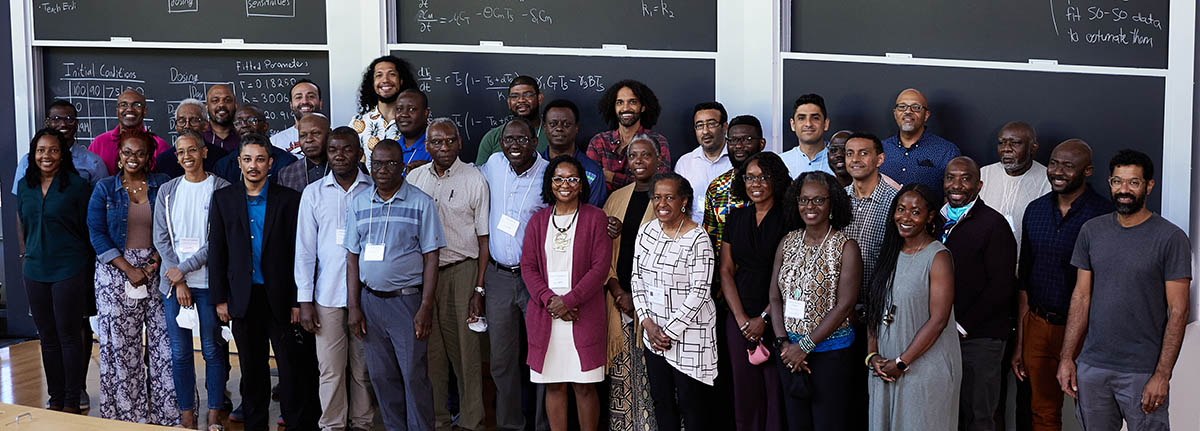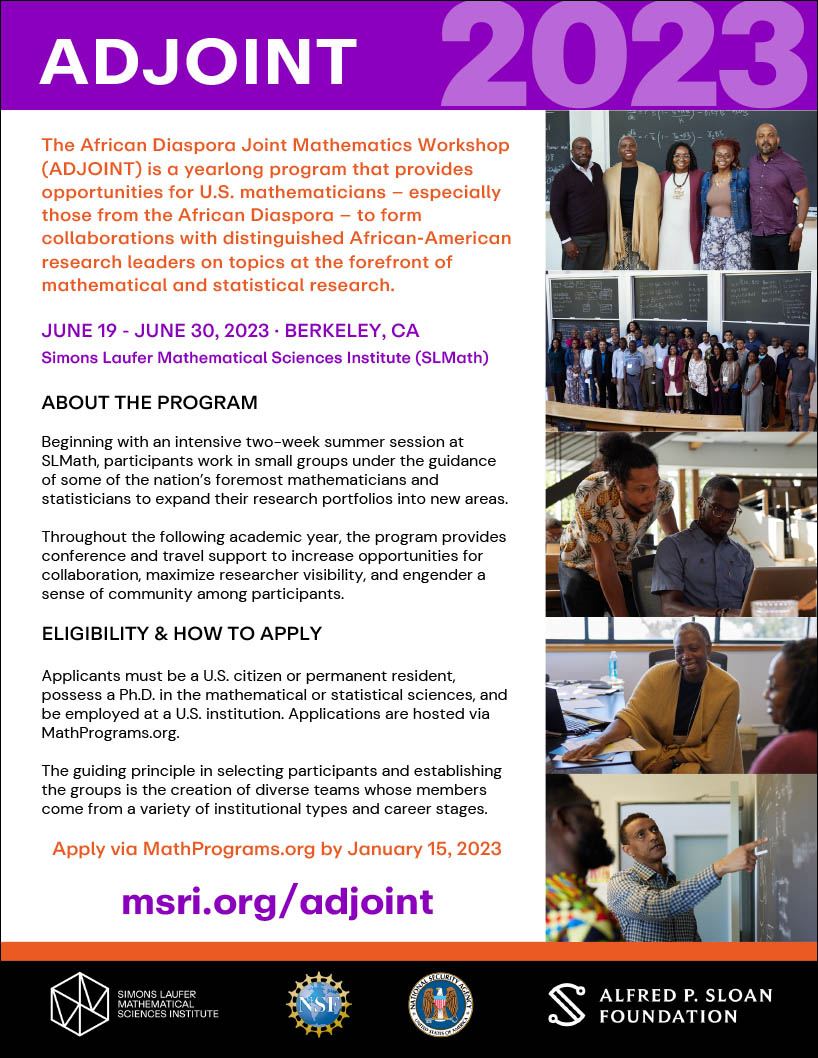
The African Diaspora Joint Mathematics Workshop (ADJOINT) is a yearlong program that provides opportunities for U.S. mathematicians – especially those from the African Diaspora – to form collaborations with distinguished African-American research leaders on topics at the forefront of mathematical and statistical research.
Beginning with an intensive two-week summer session at MSRI, participants work in small groups under the guidance of some of the nation’s foremost mathematicians and statisticians to expand their research portfolios into new areas. Throughout the following academic year, the program provides conference and travel support to increase opportunities for collaboration, maximize researcher visibility, and engender a sense of community among participants. The 2023 program takes place June 19-30, 2023 in Berkeley, California.
ADJOINT enriches the mathematical and statistical sciences as a whole by providing a platform for African-American mathematicians to advance their research and careers and deepen their engagement with the broader research community.
Applications are open October 1, 2022 through February 5, 2023.
Download an ADJOINT 2023 informational flyer (PDF)
To receive announcements, sign up for our newsletter or follow @mathmoves on Twitter.
About the Program
Each summer, three to five research leaders will each propose a research topic to be studied during a two-week workshop.
During the workshop, each participant will:
- conduct research at MSRI within a group of four to five mathematical and statistical scientists under the direction of one of the research leaders
- participate in professional enhancement activities provided by the onsite ADJOINT Director
- receive funding for two weeks of lodging, meals and incidentals, and one round-trip travel to Berkeley, CA
After the two-week workshop, each participant will:
- have the opportunity to further their research project with the team members including the research leader
- have access to funding (up to $2000 per person) to attend conference(s) or to meet with other team members to pursue the research project, or to present results
- become part of a network of research and career mentors.
The 2023 ADJOINT Program Director is Dr. Anisah Nu'Man (Spelman College).
Learn more about the ADJOINT experience in this video interview:
Eligibility
Applicants must be a U.S. citizen or permanent resident, possess a Ph.D. in the mathematical or statistical sciences, and be employed at a U.S. institution.
Selection Process
The guiding principle in selecting participants and establishing the groups is the creation of diverse teams whose members come from a variety of institutional types and career stages. The degree of potential positive impact on the careers of African-Americans in the mathematical and statistical sciences will be an important factor in the final decisions.
ADJOINT 2023 Application Process and Deadline
The ADJOINT 2023 workshop takes place at MSRI in Berkeley, California from June 19-30, 2023. The research leaders and research topics can be found below.
Applications for ADJOINT 2023 may be submitted via MathPrograms beginning August 15, 2022.
- a cover letter specifying which of the offered research projects you wish to be part of; if more than one please indicate your priorities
- a CV
- a personal statement, no longer than one page, addressing how your participation will contribute to the goals of the program (e.g., why you are a good candidate for this workshop and what you hope to gain)
- a research statement, no longer than two pages, describing your current research interests, and relevant past research activities, and how they relate to the project(s) of greatest interest to you (e.g., what motivates your current interests and what is your relevant research background)
Due to funding restrictions, only U.S. citizens and permanent residents are eligible to apply.
For more information, please contact Christine Marshall, MSRI's Sr. Administrator of Scientific Activities at coord@msri.org.
2023 Research Leaders and Topics
Folashade Agusto (University of Kansas)
Ticks, Fire and Control: Implementing prescribed fire and control measures at ticks invasion front
Description: In recent times, ticks have been expanding their habitat ranges due to climate change, among other factors, leading to increased tick-borne illness risks in the United States. Thus, it is important to find a practical and cost-efficient way of controlling and managing ticks. Prescribed burns are intentional fires used for land and forest management; they are time and cost efficient, since they can be applied across large amounts of land. They can also be effective in controlling tick populations. (Read more - PDF, and Wu & Zhang, 2020, Transmission dynamics of tick-borne diseases with co-feeding, developmental and behavioural diapause)
Prerequisites: Knowledge of PDEs and their numerical simulation. Knowledge of the SIR model and R0 will be appreciated.
Pre-readings: The following three resources are meant to familiarize applicants with the project:
- Centers for Disease Control and Prevention (CDC): Preventing ticks in the yard
- Emily Guo and Folashade B. Agusto: Baptism of Fire: Modeling the Effects of Prescribed Fire on Lyme Disease
- Alexander Fulk, Weizhang Huang, Folashade Agusto: Exploring the Effects of Prescribed Fire on Tick Spread and Propagation in a Spatial Setting. (Code used in this study can be found at github.)
Jonathan Esole (Northeastern University)
Elliptic fibrations, flops, and collisions of singularities
Description: Elliptic fibrations are beautiful and elegant geometries at the interface of algebraic geometry,number theory, and string theory. While ubiquitous, they still have many secrets to teach us. In particular, their uses by physicists indicate deep connections of their birational geometry with representation theory and hyperplane arrangements of weight systems. The geometric singular fibers over generic points of the discriminant locus of a smooth elliptic fibration are famously classified by Kodaira and Neron. They have dual graphs corresponding to twisted affine Dynkin diagrams. Under mild conditions, an elliptic fibration is birationally equivalent to a (singular) Weierstrass model. Two different crepant resolutions are connected by a sequence of flops and have some matching topological invariants, such as their Euler characteristics. We are interested in the structure of crepant resolutions of Weierstrass models of elliptic fibrations corresponding to given types of Kodaira fibers. We will explore their flops and compute their topological invariants.
Prerequisites: Familiarity with basic algebraic geometry. Background in intersection theory is a plus but not needed. Someone familiar with elliptic curves could also quickly digest the required algebraic geometry.
Donald Eugene Kemp Martin (North Carolina State University)
Inference and applications of sparse Markov models
Description: Analysis of a categorical time series is facilitated by a model that captures the statistical properties of the sequence, while being simple enough so that statistical analysis is feasible. Markov models of an order of dependence m serve this purpose. However, the number of parameters in a Markov model is exponential in m, leading to variance considerations because many parameters need to be estimated from data. Thus first-order Markov chains (m = 1) are more frequently used. Yet using a lower-order model when higher-order dependence is called for leads to bias. Sparse Markov models help with this bias-variance trade-off. A sparse Markov model (SMM) is a higher-order Markov model for which conditioning m-tuple histories are grouped into classes such that the conditional probability distribution is constant over m-tuples in the same class. The clustering reduces the number of parameters. (Read more - PDF)
Prerequisites: Basic understanding of probability and statistics, including knowledge of Markov chains, model fitting and statistical inference.
Nsoki Mavinga (Swarthmore College)
Nonlinear elliptic partial differential equations with nonlinear boundary conditions
Description: Since Bernstein's pioneering work in nonlinear elliptic equations in 1906 and Leray's work on hydrodynamical problems in 1933, there has been a significant amount of interest in the study of nonlinear elliptic partial differential equations. Henceforth, there has been a tremendous emphasis in studying partial differential equations that enable understanding and modeling of nonlinear processes such as chemical, biological or ecological processes. This area has become central in modern-day mathematical research. The study of nonlinear elliptic partial differential equations with linear boundary conditions is relatively well studied and the literature is extensive. However, problems with nonlinear boundary conditions have recently gained attention due to their importance in the study of several branches of pure and applied mathematics such as the theory of quasiregular and quasiconformal mappings in Riemannian manifolds with boundary, non-Newtonian fluids, nonlinear elasticity and glaciology, among others.
In this research project, we will focus on the qualitative (analytical) study of nonlinear elliptic equations subject to nonlinear boundary conditions. In particular, we consider problems with nonlinear reactions in the interior as well as on the boundary of the domain in consideration. We will investigate the existence, nonexistence, multiplicity, and properties of solutions. In the treatment of the proposed problems, new analytical tools will be developed as well as utilize the methods of nonlinear functional analysis such as sub-supersolution method, degree theory, bifurcation theory and fixed points theorems.
Prerequisites: Participants need to have some knowledge of (graduate) partial differential equations, and real and functional analysis.
ADJOINT Program Directors
- Dr. Edray Goins, Pomona College
- Dr. Caleb Ashley, Boston College
- Dr. Naiomi Cameron, Spelman College
- Dr. Jacqueline Hughes-Oliver, North Carolina State University
- Dr. Anisah Nu’Man, Spelman College (2023 site director)
Previous Years

MSRI, now becoming the Simons Laufer Mathematical Sciences Institute (SLMath), has been supported from its origins by the National Science Foundation, now joined by the National Security Agency, over 100 Academic Sponsor departments, by a range of private foundations, and by generous and farsighted individuals. ADJOINT 2023 receives additional support from the Alfred P. Sloan Foundation

